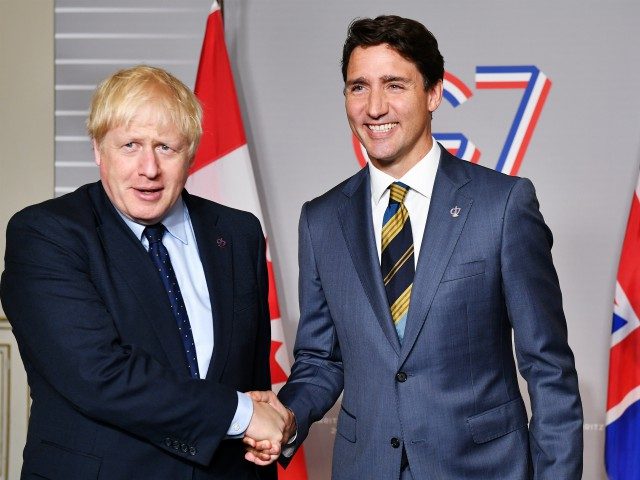Canadian Prime Minister Justin Trudeau has said that it will be “fairly straightforward” to roll over the Canada-EU trade deal into a UK-Canada one. Meanwhile, British negotiators are still attempting to agree on a Canada-style trade deal with the European Union.
The Comprehensive Economic and Trade Agreement (CETA) between the European Union and Canada sees around 95 per cent of goods tariff- and quota-free.
Prime Minister Trudeau said of the terms which will be rolled over after the UK leaves the EU transition period at the end of this year: “There have been many discussions over the past years between myself and Prime Minister Johnson and his predecessor on that seamless transition, on a rollover of the CETA between Canada and the EU, to be the basis for a Canada-UK free trade agreement that would allow certainty for Canadian and British companies going into the future.”
“I think you’ve heard that there are significant complexities that the UK is grappling with in terms of negotiating the post Brexit agreement with the EU. I can highlight that it’s fairly straightforward with Canada and we are certainly very optimistic in the ability to see things roll over smoothly,” Mr Trudeau said on Thursday, according to The Guardian.
The “significant complexities” that the Canadian premier referred to are the ongoing negotiations between London and Brussels over issues such as fishing, state intervention in business, and arbitration of the trade deal. The UK maintains that it regain full control of its laws, borders, and waters as a sovereign nation, and has been working on agreeing to a Canada-style free trade agreement with the bloc.
Barnier Claims UK and EU Have ‘Huge Common Responsibility’ to Stop Full Brexit https://t.co/0xJuuLja1c
— Breitbart London (@BreitbartLondon) October 23, 2020
Brussels negotiators have, however, ruled out a Canada-style deal on grounds that the UK is a major economy on the EU’s border, making it a competitive threat. Yet the EU still expects in exchange for a less favourable trade deal than it has with Canada continued access to Britain’s lucrative fishing waters.
On October 16th, Prime Minister Boris Johnson declared that talks had failed and would not return to the negotiating table unless the EU shifted on its position. Mr Johnson said that “from the outset, we were totally clear that we wanted nothing more complicated than a Canada-style relationship based on friendship and free trade. To judge by the latest EU summit in Brussels, that won’t work for our EU partners. They want the continued ability to control our legislative freedom, our fisheries, in a way which is completely unacceptable to an independent country.”
He added: “Given they have refused to negotiate seriously for much of the last few months, and given this summit appears to explicitly rule-out a Canada style deal, I have concluded we should get ready for January 1st with arrangements which are more like Australia’s, based on simply principals of global free trade.”
Less than one week later, after an apparent change in tone from the EU’s lead negotiator Michel Barnier, talks are back on.
President of the European Commission Ursula von der Leyen said on Thursday that the two parties were making ” good progress”, but that there remains “two critical issues: level playing field and the fisheries, [where] we would like to see more progress”.
If London and Brussels cannot agree on a deal, the UK will leave the bloc on World Trade Organization (WTO) terms, otherwise called a ‘no-deal’ Brexit. Mr Barnier claimed last week that it was the “common responsibility” to stop a clean-break Brexit.
Last Minute Talks: Downing Street Warns ‘Time is Very Short’ For Negotiators to Sign Brexit Deal https://t.co/0nIrNRZxFS
— Breitbart London (@BreitbartLondon) October 27, 2020

COMMENTS
Please let us know if you're having issues with commenting.